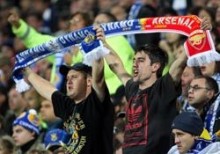Ukrainians often compare soccer to theater, and call soccer games “shows.” If one continues the analogy, a good soccer game, like a good theatrical performance, must attract a lot of spectators, who should not be disappointed once the show is over, and they should want to come back again and again.
But whereas for a successful theatrical performance it is enough to have a professional stage director and inspired performances from the actors, in soccer much depends on who the rival team is.
Until this year Kyiv’s Dynamo Stadium, which seats nearly 17,000 people, used to be full once or twice a year. The other games, even those that Dynamo Kyiv would win with confidence, did not enjoy full houses. Even this year, when Russian coach Yurii Semin changed Dynamo’s way of playing for the better, only about 10,000 soccer lovers regularly attend games.
The reason is simple. Like love, two sides are needed for full-fledged soccer. Soccer attracts attention and gathers full arenas only when the names of the rivals promise a desperate struggle for victory, when the game is a real challenge for the host team. Although it is unpleasant to note, in spite of the rising level of the national championship, most of the matches look routine both in terms of playing and general organization. This is especially noticeable in the Champions League games that start each September and bring the residents and guests of Kyiv to a soccer planet, where everything is real.
However, even the games played during the main soccer club tournament have gradually stopped being a holiday for soccer fans. How can it be a grand day when your team looks much weaker than its opponents and everyone is interested only in by how much our team loses, rather than in who will win?
This is the way it has been for the past two years. This is why the Dynamo players’ first game against Arsenal had more than just sports importance. This game was supposed to answer the question of whether Dynamo is a team worthy of playing in such a high-level tournament. Nobody even remembered that 10 years ago we seriously expected Dynamo to win in the Champions League.
Before the game the Kyiv players had only a historic advantage over the Londoners. Until now, Dynamo always defeated Arsenal at home. This happened in 1998 and 2003. Since then, both teams have undergone a considerable change. Arsenal has lost its leading positions in the English championship, but has won the spectators’ sympathy for its brilliant and spectacular performance. Dynamo has maintained its positions in the home championship, but it experienced regular failures on the international level.
Despite the fact that all the players of the Arsenal are young, the team is still “old” in the sense that it has been coached for over 10 years by the French expert Arsene Wenger, who selects players from all over the world to play in his style. Dynamo, in spite of its players’ ages, is a “young” team. Since January of this year coach Semin has started to form a new Dynamo with a new playing style. During the previous eight months the team has done well. Thus, the game against Arsenal was supposed to be a real test of quality.
Readers may not agree with me, but I prefer a small stadium with full stands to a big one that is half-full. I don’t know whether this game would have gathered a full crowd in Kyiv’s main arena, which is closed for repairs, but there is no doubt that the full stands in Dynamo Stadium created a special atmosphere around the game. Neither the late kick-off game nor the cool weather that threatened rain or the nearly European-level ticket prices prevented people from coming. They came to watch soccer, expecting a holiday. It was great that their expectations came true.
It is not worthwhile arguing that most of the Arsenal players play on a higher level than most of the Dynamo players. In all times, in order to resist such a rival successfully, Dynamo had to demonstrate its game, good organization, dedication, and inspiration against the guests’ mastery.
All this took place on a recent Wednesday at the Dynamo Stadium. During the first half of the game the leaders of the Arsenal attack, Emmanuel Adebayor, Robin Van Persie, and Cesc Fabregas, each had an opportunity to score a goal. But they didn’t. In the second half, once the Dynamo players had overcome their excitement, Arsenal’s stars could do little in the confrontation with the confident Dynamo defense line. Ayla Youssuf, Ognjen Vukojevic, Taras Mykhalyk, and their fellow players ably stopped their opponents’ attacks, and later launched their own attacks with Milos Ninkovic, Oleksandr Aliev, Roman Eremenko, and Ismael Bangoura.
Goalkeeper Stanislav Bogush, who is a novice at this level of tournament, was working confidently at the net. When Vukojevic (Dynamo) and Bacary Sagna (Arsenal) collided, the referee called for an 11-meter strike into Arsenal’s net and Bangoura scored a goal, Dynamo finally started to play its own game. A few regrettable mistakes in the final minutes prevented the Kyivites from winning, and William Gallas tied the score.
But the disappointment of the lost victory was not too great. The coaches and the Dynamo players, as well as the spectators in the stands, understood that once again we are competent participants of the Champions League, and we can struggle again for victory in a game against any opponent. This is the most important thing right now. Good soccer times have returned to Kyiv. So, we can expect victories.
UEFA Champions League, Group G: Dynamo Kyiv (Ukraine) – Arsenal (England) – 1:1, Porto (Portugal) – Fenerbahce (Turkey) – 3:1.







